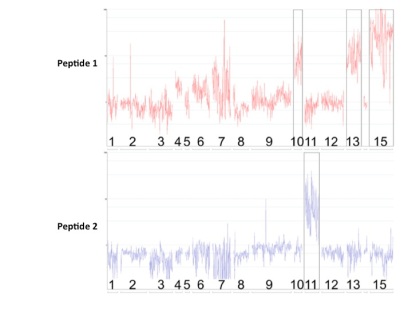Scientists at Arizona State University have moved closer towards a universal immunosignature diagnostic platform for cancer.
Publishing in the journal PNAS, they describe the use of a platform that applies antibodies circulating in the blood of cancer patients to a large microarray of random peptides. Those antibodies that bind to one or more peptide are then characterised to create an “immunosignature” for each individual patient.
When the immunosignatures of multiple patients are compared, it becomes possible to pick out common peptides that keep cropping up. These could form the basis of a diagnostic test for cancer that would only require a drop of a patient’s blood. It may also be possible to use these peptide immunosignatures to inform the most effective type of cancer treatment.

In the figure above, the expression levels of two immunostimulatory peptides are determined for 1516 cancer patients across 15 different cancer types. Peptide 1 shows high expression in 3 classes of cancer (10, 13 & 15), while peptide 1 is only expressed at high levels in 1 class of cancer (11).
Image credit: Stafford et al. 2014.
Repost from the Stojdl Lab blog.




